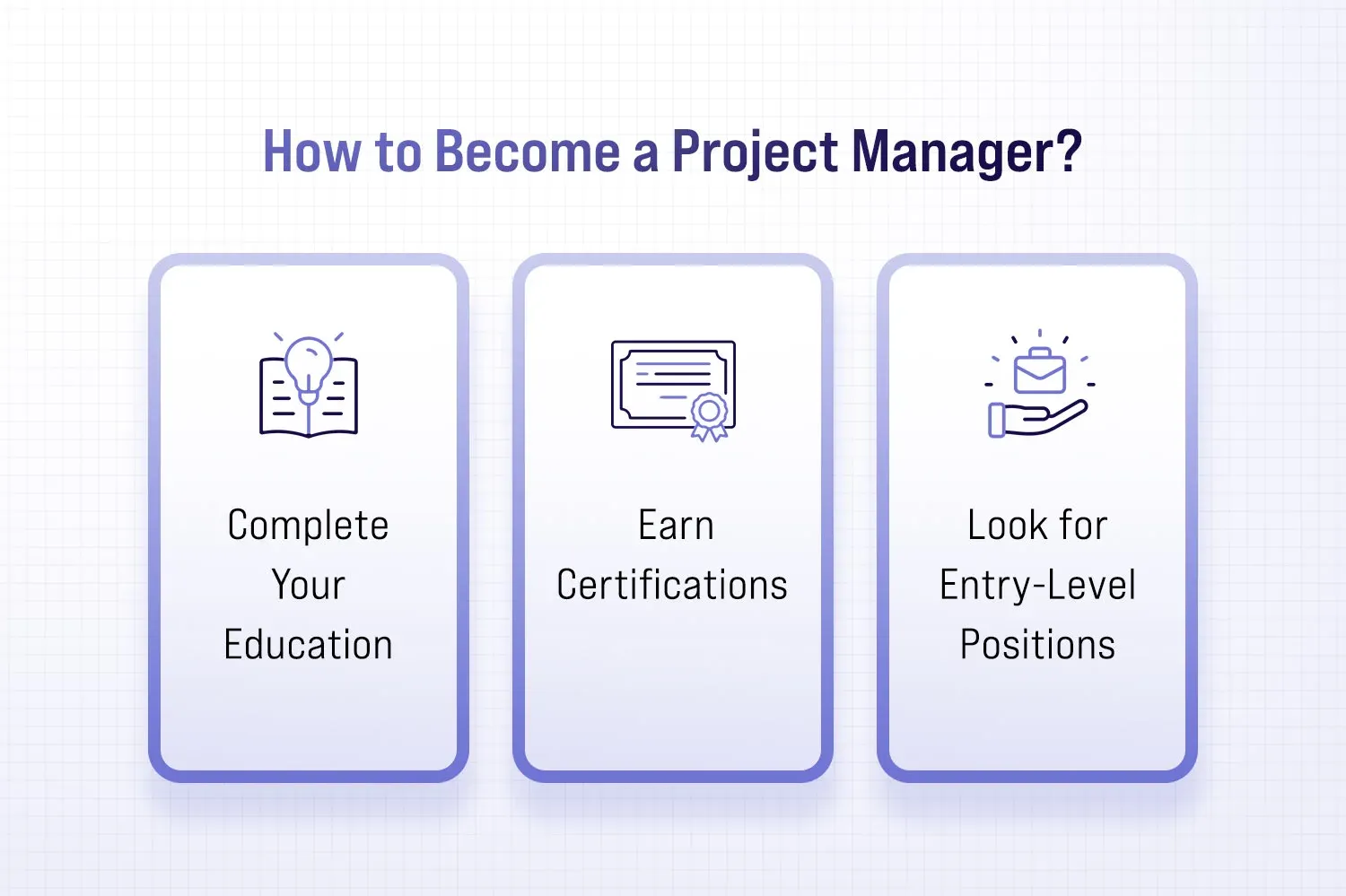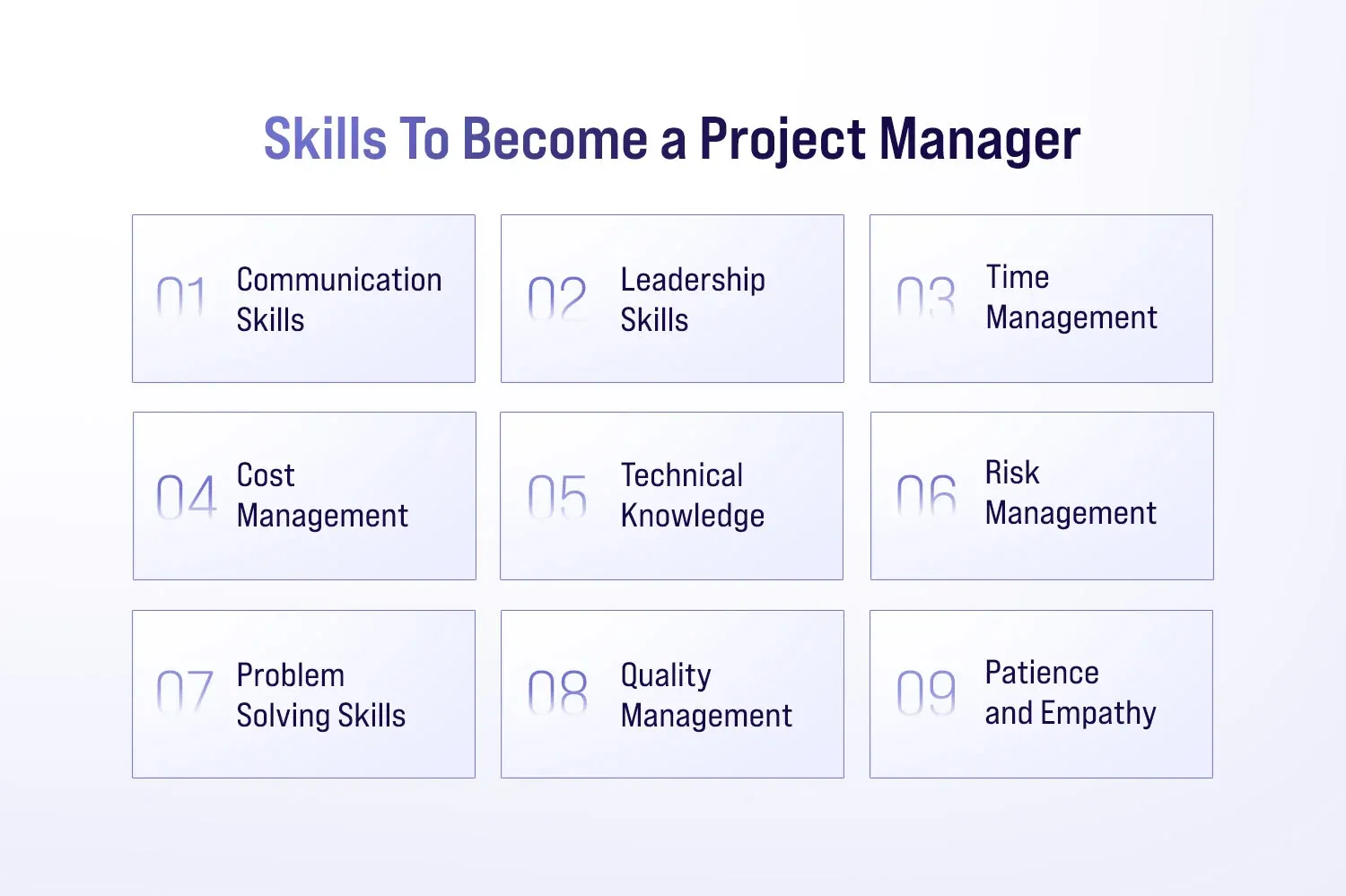How to Become a Project Manager?

Project management stands out as a highly adaptable and sought-after career choice in the modern employment landscape. Whether it’s developing a new software system, launching a marketing campaign, or constructing infrastructure, a project manager ensures every step of the project is executed smoothly, on time, and within budget. For those exploring a career in this domain, grasping the roadmap to becoming a project manager is crucial.
This guide outlines how to become a project manager in India, explores the responsibilities and skills required, and answers frequently asked questions to help you start your career confidently.
How to Become a Project Manager?
There isn’t a universal route to entering the project management profession—paths vary based on individual backgrounds and goals. Some enter the field directly after graduating in a relevant field, while others transition from different roles over time. Here’s a roadmap to help you navigate your journey into project management:

Complete Your Education
To begin your career as a project manager, the foundational step is completing your formal education.
Education equips you with essential theoretical knowledge and demonstrates your commitment to professionalism. Typically, aspiring project managers pursue a bachelor’s degree in fields such as business administration, computer science, engineering, or management. These disciplines provide the groundwork for understanding organizational operations and project lifecycle frameworks.
Many professionals also pursue postgraduate qualifications, such as an MBA or a master’s in project management, especially if they aim for senior-level roles in larger companies. This educational foundation prepares candidates to manage team dynamics, evaluate project outcomes, and align project goals with business objectives.
Earn Certifications
Certifications act as a vital link, translating theoretical knowledge into hands-on project management expertise.
They authenticate your skills and substantially boost your professional profile, particularly in competitive hiring environments. Beginners often find the Certified Associate in Project Management (CAPM) an excellent entry-level credential. It provides foundational knowledge for individuals without prior experience.
For mid-career practitioners, the Project Management Professional (PMP) credential represents an internationally respected benchmark, with attainment often correlating to enhanced career prospects and increased earning potential. Industry-specific credentials like Scrum Master certifications are also valuable, especially in Agile or IT-driven environments.
Pursuing certifications signals your dedication to mastering the methodologies and strategies required for effective project leadership.
Look for Entry-Level Positions
Practical experience is indispensable for career advancement in project management.
Aspiring professionals should seek foundational roles like project coordinator, junior analyst, or assistant project manager to build expertise. These roles expose you to real-world project workflows, team collaboration, and stakeholder communication. As you gain experience, you’ll naturally take on more responsibilities, preparing you for mid-level and eventually senior project management roles.
Contributing innovative ideas, showing initiative, and learning from seasoned professionals can accelerate your progression into management roles.
Duties And Responsibilities of a Project Manager
A project manager plays a central role in driving a project from concept to completion, ensuring that it meets its goals while staying on schedule and within budget. Their responsibilities span across planning, team leadership, execution, budgeting, documentation, and post-project support. Below is an in-depth outline of the primary tasks and obligations of a project manager.
Planning the Project
A fundamental duty of a project manager involves crafting a detailed project blueprint. This plan outlines the project’s scope, required resources, budget, timeline, communication strategy, execution method, and post-project support. It acts as the backbone for all project execution and often doubles as a proposal for stakeholders prior to approval.
Leading the Team
A project manager assembles and leads the project team, assigning tasks based on each member's strengths. They define objectives, offer guidance, and maintain team cohesion throughout the project lifecycle. Exceptional leadership and communication abilities are key to inspiring team members and addressing disputes constructively.
Executing the Project
Beyond planning, project managers oversee the execution phase. They supervise the completion of tasks, ensure project milestones are met, and communicate consistently with team members and stakeholders to keep everyone informed and engaged.
Managing Schedules
Time management is critical. Project managers are responsible for keeping the project on track by creating realistic timelines, monitoring progress, addressing delays, and ensuring that work stays aligned with deadlines. They also activate backup strategies when unforeseen obstacles emerge.
Overseeing the Budget
Project managers develop and manage the project budget, aiming to optimize resource use while avoiding cost overruns. They monitor expenditures, reallocate resources as necessary, and guarantee the project stays financially sustainable from start to finish.
Preparing Documentation
Clear documentation helps track a project’s progress and ensures accountability. Project managers gather data, produce written and verbal status reports, and archive all key decisions and actions for future reference. This documentation is also useful for evaluating project outcomes and guiding future initiatives.
Maintaining and Troubleshooting Deliverables
After project completion, a project manager must ensure that a plan is in place for ongoing support, maintenance, and troubleshooting. This involves identifying how the final deliverables will be sustained and ensuring a smooth transition to the teams or individuals responsible for long-term operations.
Skills To Become a Project Manager
To be successful in their role, a project manager must possess a well-rounded blend of technical, interpersonal, and organizational skills. These abilities allow them to lead teams, manage resources, and deliver projects effectively within defined constraints such as time, budget, and scope. Below are the must-have competencies for any successful project manager:

Communication Skills
Among the most vital skills for a project manager is the ability to communicate clearly and persuasively. Projects involve multiple stakeholders — from clients and executives to team members and external vendors. The ability to clearly convey ideas, updates, expectations, and feedback across all levels is essential.
- Written and verbal communication for reports, presentations, and daily updates.
- Active listening to fully grasp stakeholder expectations and address concerns.
- Conflict resolution by fostering honest and constructive dialogue.
Good communication helps prevent misunderstandings, keeps everyone aligned, and fosters a culture of collaboration.
Leadership Skills
Being a project manager means leading without always having direct authority. Strong leadership involves more than just assigning tasks — it’s about inspiring, guiding, and supporting your team to perform at their best.
- Motivating team members to stay committed to goals.
- Delegating tasks according to individual strengths.
- Influencing without micromanaging, empowering team members to take ownership.
- Decision-making even under pressure or ambiguity.
A capable leader cultivates trust and mutual respect within the team, which is critical for sustained success.
Time Management
Projects are always working against the clock. A project manager needs to be a master in time management, ensuring deliverables are completed on time without compromising quality.
- Establishing feasible schedules while considering resource constraints and project scope.
- Setting priorities and adjusting them as the project evolves.
- Identifying time-wasting activities and streamlining workflows.
The ability to manage time efficiently can be the difference between a successful project and one that misses its deadline.
Cost Management
Project managers are often responsible for the budget and financial health of a project. This means allocating resources effectively while keeping an eye on costs.
- Establishing feasible schedules while considering resource constraints and project scope.
- Tracking expenditures to ensure nothing goes over budget.
- Making financial decisions, such as reallocating funds if certain elements need more investment.
Effective cost control not only protects the bottom line but also strengthens the credibility of the project manager.
Technical Knowledge
While project managers aren’t always required to be technical experts, familiarity with relevant tools and technologies is a major advantage.
- Proficiency in project management platforms (e.g., MS Project, Jira, Trello, Asana).
- Familiarity with methodologies such as Agile, Scrum, Kanban, and Waterfall.
- Understanding of industry-specific tools (e.g., for IT, construction, or healthcare).
This technical insight fosters smoother collaboration with specialists and leads to more informed decisions.
Risk Management
Every project carries inherent risks, whether financial, operational, or relational. A competent project manager must proactively foresee, assess, and mitigate these risks.
- Risk identification during the planning phase.
- Developing mitigation plans in advance.
- Reacting quickly when issues arise to prevent escalation.
Risk management is key to ensuring a project doesn't derail due to unforeseen complications.
Problem-Solving Skills
Projects frequently deviate from initial plans. Effective project managers are also sharp problem-solvers who can think critically, weigh options, and find solutions under pressure.
- Analyzing root causes of issues rather than treating symptoms.
- Evaluating alternative solutions quickly.
- Making strategic choices that balance short-term fixes with long-term project health.
A problem-solving mindset ensures progress continues despite hurdles.
Quality Management
Mere adherence to schedule and financial constraints constitutes minimum viability - true project success demands deliverables that consistently satisfy or surpass established quality benchmarks through rigorous standards maintenance.
- Setting measurable quality benchmarks at the start.
- Implementing quality assurance practices, such as reviews or testing phases.
- Monitoring deliverables to ensure they align with expectations and specifications.
Quality management helps ensure stakeholder satisfaction and long-term success.
Patience and Empathy
A high-pressure environment, shifting priorities, and interpersonal friction can test a project manager’s emotional control. Patience and empathy are critical soft skills that foster strong team dynamics.
- Staying calm during high-stress situations.
- Listening empathetically to team concerns and frustrations.
- Encouraging collaboration over confrontation.
A composed and understanding project manager fosters a supportive work environment that enhances efficiency.
Average Salary of a Project Manager
The typical annual salary for a Project Manager in India hovers around ₹10,00,000, based on recent industry reports. This median base salary reflects the middle of the pay spectrum—indicating that 50% of professionals earn above this figure, while the other half earn below.
Beyond base pay, project managers often enjoy supplementary benefits such as performance bonuses, incentives, or profit-sharing arrangements. The estimated additional pay averages around ₹2,00,000 annually, bringing the total estimated yearly compensation to approximately ₹17,00,000.
However, actual salary figures can vary significantly depending on several factors, including:
- Industry (IT, construction, finance, healthcare, etc.)
- Experience level
- Geographic location
- Company size and reputation
- Certifications held (e.g., PMP, CAPM)
Professionals with advanced degrees, in-demand certifications, or niche expertise may command salaries well above the national average.
FAQs
Q1. How to become a project manager without experience?
Ans: If you don’t have direct project management experience, start by identifying transferable skills you’ve gained in previous roles—such as planning, organizing, leading, or budgeting. Seek chances in your current role to contribute to projects or handle minor coordination duties.
Earning an entry-level certification like the Certified Associate in Project Management (CAPM) or the Google Project Management: Professional Certificate can demonstrate your commitment and build foundational knowledge. Apply for roles such as project coordinator, operations associate, or junior project manager to gain hands-on experience and work your way up.
Q2. How to become a project manager after 12th?
Ans: After completing your 12th, the most common path to project management is to pursue a bachelor’s degree in a relevant field such as business administration, engineering, IT, or management. During your studies, develop communication, leadership, and organizational skills.
Consider taking project management courses or internships to gain early exposure. Once you complete your degree, begin with an entry-level role, gain experience, and consider certifications like CAPM to strengthen your credentials.
Q3. How to become a project manager in an IT company?
Ans: To become a project manager in an IT company, start by building a strong technical foundation with a degree in computer science, information technology, or a related field. Gain experience in technical roles such as software developer, QA tester, or business analyst, and seek opportunities to take on leadership or coordination responsibilities.
Study key project management frameworks like Agile, Scrum, and Waterfall to build foundational knowledge. Earning certifications such as PMP, Certified Scrum Master (CSM), or PMI-ACP can give you a competitive edge. Transition into IT project coordination roles and work your way up to project manager positions.
Summing Up
The role of project manager demands more than just organizational skills, it calls for leadership, strategic thinking, empathy, and a willingness to adapt in a dynamic environment. With the right mindset and skill set, project managers play a pivotal role in shaping business outcomes across industries.
By building a strong foundation through formal education, earning industry-recognized certifications, and gaining hands-on experience through entry-level roles, you can position yourself for long-term success in project management. If you’re motivated by structure, collaboration, and the satisfaction of seeing a project through from start to finish, then project management could be the ideal career path for you.

